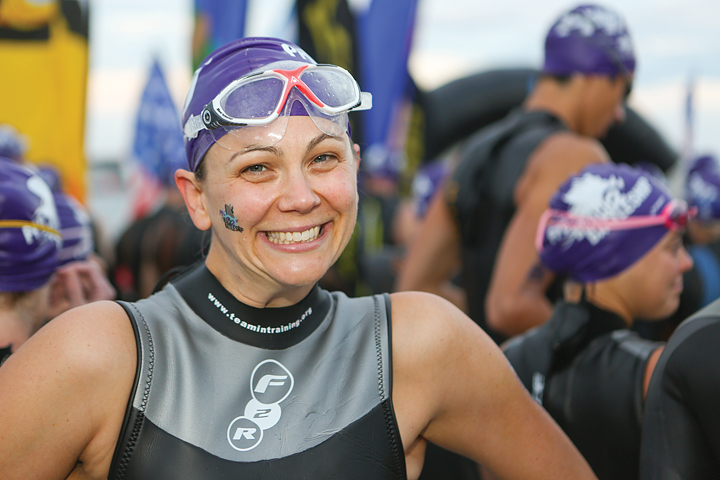Breast cancer survivor Teresa Dunlap said while undergoing eight rounds of chemotherapy and five surgeries, “You don’t consider yourself a hero. You’re just trying to move forward because your family needs you.” But on Oct. 17, “hero” was a label Dunlap embraced.
She was one of seven PPD Heroes who, with the help of clinical trials, overcame serious illnesses to race in Wilmington’s PPD Beach2Battleship triathlon.
Dunlap was part of a relay team completing the half-iron distance course. Her family was her biggest motivation to beat breast cancer, but Oct. 17, during the grueling 13.1-mile run, it was the encouragement of a complete stranger from which she drew strength.
His name was Wade, she said, and he started running alongside her just after the start.
“He said, ‘screw my time,’ and he ran with me the whole race,” Dunlap said.
Dunlap did have plenty of family support. Her sister ran alongside her for part of the race and her husband and young son were waiting for her at the finish line.
Simply participating in the race made her feel victorious, she said. In 2012, her son was diagnosed with autism. Later that year, she found a lump in her breast and doctors told her she had breast cancer.
She remained positive because she knew from working at drug development company PPD that she had treatment options and “my family needed me; my son needed me,” she said. But when she finished treatment she didn’t feel like a survivor.
“I was 60 pounds overweight and asking myself, ‘You have a second chance in life, are you truly doing what you’re supposed to be doing with it?’ And I wasn’t.”
In 2014, Dunlap started exercising and eating better with the goal of racing in the 2015 PPD Beach2Battleship.
While finishing the race was Dunlap’s main objective, she said with the encouragement of those running alongside her she kept a decent pace, too.
“I was trying to do it under three hours,” she said with a grin after crossing the finish line in downtown Wilmington. “I think I did!”
PPD hero Jolene Hopper from Fort Mill, South Carolina, was also racing to celebrate surviving breast cancer. She completed the entire half-iron distance course, jumping into Banks Channel in Wrightsville Beach at 8:30 a.m. for the 1.2-mile swim and finishing about seven hours later after biking 56 miles and running 13.1 miles.
She participated in the race for the first time in 2009 to mark 10 years since being diagnosed with breast cancer. The diagnosis shocked the wife and mother of two because she ate well, exercised and didn’t have any family history.
“It was like my world stopped. I thought, ‘I don’t know if I’m going to see my kids grow up,’” Hopper said.
She underwent a clinical trial involving a combination of drugs. This year marks “16 years with no recurrence,” she said.
Despite having raced the course before, Hopper said the 15 mph north winds made this year’s event more exhausting and she became dehydrated with six miles to go.
She sucked on salt sticks to replenish her electrolytes and drew on her extensive racing experience — since her diagnosis she has completed 10 marathons and multiple triathlons — to reach the finish line.
Becoming depleted of energy was a dangerous prospect for all participants, but especially PPD Hero Meg Roberts, who raced the first two legs of the iron distance course — 114.4 miles — despite having Type 1 Diabetes.
Her body cannot produce insulin, a hormone that enables the body to use sugar from food in the blood, then convert it into energy, she explained.
If her blood sugar gets too low and she doesn’t eat, she can “fall to the ground, have a seizure, go into a coma or die within minutes,” Roberts said.
Luckily, she said, clinical trials have determined the parameters in which she needs to keep her blood sugar levels and insulin injections help with maintenance.
She has a continuous glucose monitor under her skin that tracks her levels and transmits readings to a monitor on her bike. Throughout the 112-mile leg of the race, she also kept food close by, stashed in a box on her bike and other handy places.
“That’s what these are for,” she said after the race, turning around to reveal pockets on the back of her racing jersey. “There’s a lot of eating involved in cycling.”
She’s thrilled medical advances have helped her race, but that’s not the most important aspect of her life clinical trials have affected. When she was first diagnosed with Type 1 Diabetes at age 10 in 1988, doctors said she would never be able to have children.
“But clinical trials have helped me to do something wonderful and life changing — in fact, two wonderful and life-changing things,” she said with a smile, showing a photograph of her two young sons.
email [email protected]




